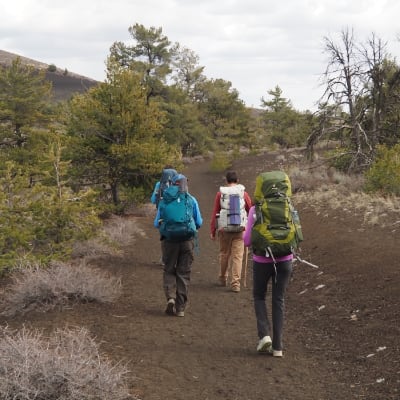Backpacking Basics
camping
There is something exciting to me about the thought of hiking for miles out into the middle of nowhere to spend a few days. To really become one with the wilderness and to realize how little you actually need is enlightening and empowering. That is why I love backpacking. This article is meant to help you learn the basics about how you can thrive in the backcountry around you.
I first went backpacking with my Dad and brother when I was nine or ten. It was a short trip, and I probably complained a lot about the weight of my backpack, but it helped me gain an appreciation for the activity. As the years have passed I have become increasingly enthralled by the concept of backpacking. My ability to carry heavier weights and hike longer trails has increased and so has my love for being in places where very few others have been.
For anyone who is intimidated by backpacking, I hope to ease some concerns and help you realize that this is absolutely something that you can do! I won’t deny that it can be scary out on your own, but by remembering a few basic things you should be well on your way to living large in the backcountry.
The first thing you need to do is know how far you are able/want to go. Remember that when you are backpacking you will often have between 20 and 30 pounds on your back which will impact how fast and far you can travel. If this is one of your first trips, I would recommend 2-3 miles each day of your expedition. It is also important to take into account the elevation change as you plan where you want to go.
Once you have a spot, make sure to get any permits and make any reservations so you have a place to stay. Most popular backpacking locations require this, but if you look there are also trails without any restrictions. In many places there are certain animals you have to be cautious of, particularly bears. In general, bears will not attack unless they feel threatened, however, they are often curious, especially when food is involved. That is why it is crucial to bring a bag for all of your food and anything else that is smelly to hang high above the ground where a bear can’t get to it.
Since we are on the topic of food, here are a few more things to be mindful of. Choose a food preparation area that is at least 200 feet from your sleeping area. This will limit the possibility of critters coming into your tent. When you are packing your food, choose meals that are lightweight and compact but will still fill you up.
Because you will have limited space, don’t bring your big tent and heavy sleeping bag. Choose gear that weighs less and isn’t too bulky. Backpacking is often about minimalism, consider making a list of what is necessary and what is not, then go from there as you pack.
On my necessary list I would include:
- Sleeping bag
- Sleeping pad
- Tent/shelter
- Food
- Water bottle
- Water filter
- Stove
- Cat hole shovel(fondly referred to as the "pooper scooper") (for when nature calls)
- Hat
- One extra change of clothes
Overall I would try to aim for 25 pounds in your pack. That should provide for enough food and gear to be comfortable, but not so much that it becomes a burden. Again, less can often be more when it comes to backpacking.
In places where you will not be traveling near a body of water, it becomes important to know how much water you need for cooking and personal hydration. In these cases, I would recommend choosing meals that don’t require much water so you can bring more to drink. One liter of water weighs about two pounds which adds up very quickly. Water will likely be the heavier thing in your backpack, but also the most important.
With a place to go and gear in your pack, now all you need is to get out and go backpacking.
Enjoy the great outdoors and stay safe!
 Backcountry Basics
Backcountry Basics